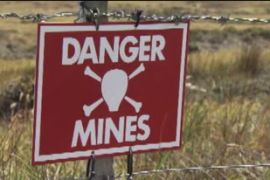UK ‘regrets’ Falklands war deaths
Islands’ economy booming 25 years after the conflict in which 900 people died.

More than 900 people died in the war, including 655 Argentines, 255 British troops and three islanders, before Argentine forces surrendered on June 14, 1982.
‘A little Britain’
Both Britain and Argentina will hold several events to mark the war over the next three months.
| Falklands facts |
– The Falklands are situated in the south Atlantic ocean, 1080km east of Argentina and around 13000km southwest of Britain – The archipelago consists of two main islands and 200 smaller ones – The land is sparsely populated with a population of just over 3,000 |
To mark the anniversary of the Argentinian invasion of the islands, known to the South American nation as Las Malvinas, Al Jazeera is running a series of reports on the legacy of the conflict.
In the first, correspondent Lucia Newman travelled to the remote islands in the South Atlantic.
She found that the archipelago, consisting of two main islands and 200 smaller ones, bears all the hallmarks of a traditional English village including a church, a post office and a pub.
The local population numbers only 3,000 and is greatly outnumbered by the islands’ estimated 660,000 sheep.
But despite being situated only 1,000km from Argentina and around 13,000km from the UK, Katherine Jacobson, the owner of a pub in the islands’ main town of Stanley, says there is no doubt over the locals’ allegiance.
“There is no doubt about it we are British. We are from England and all our ancestors have come from England or Scotland,” she said.
Good life
Such a sentiment is echoed by Andreas Short, a farmer and sixth-generation Falklander whose family moved to the island from England in 1849.
“I haven’t taken the keys out of my vehicle in 14 years,” he says.
 |
| Argentina still claims sovereignty over “Las Malvinas” |
“I haven’t locked the back door of my house because we don’t have a lock on the back door of our house in Stanley, and I think that counts for a lot more than nightclubs or supermarkets.”
Life is good in the Falklands and much of the islands’ prosperity can be ascribed to the invasion by general Leopoldo Galtieri’s military junta a quarter of a century ago.
Prior to the war the islands were little more than an almost feudal farm state.
Today, thanks to lucrative fishing rights and land reform, they are a prosperous, economically self-sufficient overseas territory that provides free health care and education up to university level.
Mike Summers, a legislative councillor in Stanley, says the war was the catalyst for much of that change.
“Had it not been for the war the Falklands very probably wouldn’t have developed to the extent it has and certainly not at the speed it has,” he says.
Argentinian threat
But despite the good times and a thriving tourism industry, the legacy of war is never far way for locals.
| Related |
The soft, peaty terrain means clearing many of the 20,000 landmines during the war has been difficult with many sinking under the surface.
The presence of a military base is testament to fears that there could be another military invasion by Argentina.
Increased “sabre-rattling” by the government of Nestor Kirchner in Buenos Aires worries locals.
Argentina has consistently maintained its claim to sovereignty over the islands and only last week it ended a deal with the UK to share any oil found near the islands.
Explaining the decision, Jorge Taina, Argentina’s foreign minister, said: “The Argentine decision brings an end … to an instrument the United Kingdom sought to use to justify its illegitimate and unilateral action to explore for resources that belong to Argentines.”
For Falklanders such as Andreas Short there is no doubting the Argentinian government’s intentions.
“Oh, they are definitely a threat,” he says. “There is no two ways about it, they are definitely a threat.”